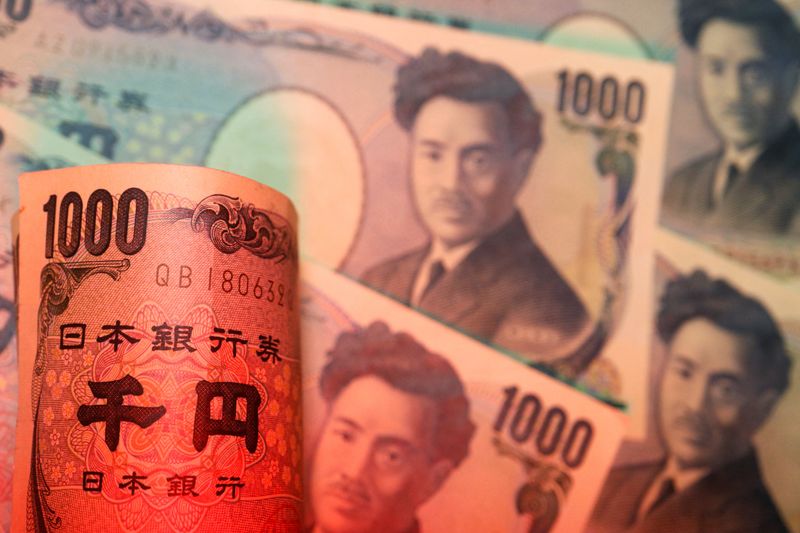By Rae Wee
SINGAPORE (Reuters) - The yen was heading on Friday to its first weekly gain in more than a month after Japanese authorities intervened in markets to support the yen for the first time since 1998, while a towering dollar kept other currencies pinned near multi-year lows.
The yen was up about 0.1% at 142.22 per dollar in Asia, after a more than 1% rally in the previous session on news that Japan had bought yen to defend the battered currency, although trading was thin on Friday with the country's markets closed for a public holiday.
The intervention, conducted late in Asia trading hours on Thursday, came after the Bank of Japan stuck with its ultra-low rate policy, which prompted a drop in the yen past 145 per dollar to a 24-year low.
"Given that (the BOJ) runs ... against the grain of rising interest rates, in order to have any chance of success, they're going to have to be in this for the long haul," said Ray Attrill, head of FX strategy at National Australia Bank.
"My sense is that the law of diminishing returns will set in, as far as intervention is concerned."
Sterling lost 0.27% to $1.12285, uncomfortably close to a 37-year low of $1.1213 hit in the previous session and little helped by a 50 basis-point rate hike by the Bank of England overnight.
The euro, Aussie and kiwi were likewise languishing near fresh lows on Friday in the face of a surging greenback, which received a boost from a very hawkish Federal Reserve policy announcement and rising Treasury yields that kept the dollar in demand.
The benchmark 10-year Treasury yield hit an 11-year high of 3.718% overnight, while the two-year yield remained well above 4%.
"Ironically, I do think that the rise in U.S. Treasury yields overnight, particularly the 10-year area, is a direct result of the view that the Bank of Japan is going to have to be selling Treasuries, to supply the dollars in order to intervene," said Attrill. "Outside of dollar/yen, it will make the dollar even more attractive against other currencies."
The U.S. dollar index rose 0.16% to 111.40, hovering near a two-decade high of 111.81 hit in the previous session, and is on track for a weekly gain of 1.5%.
The euro fell 0.11% to $0.9823, close to a 20-year trough of $0.9807 hit overnight.
Flash September purchasing managers' indexes for the euro zone, the UK and the United States, due later on Friday, will provide a better overview regarding the darkening global outlook.

The risk-sensitive Aussie dropped 0.38% to $0.66165, while the kiwi fell 0.31% to $0.5828. Both had fallen to their lowest since 2020 in the previous session.
Westpac chief economist Bill Evans said in a note on Friday that he has lowered his forecast for the Aussie to $0.65 by the end of this year, from $0.69 previously.